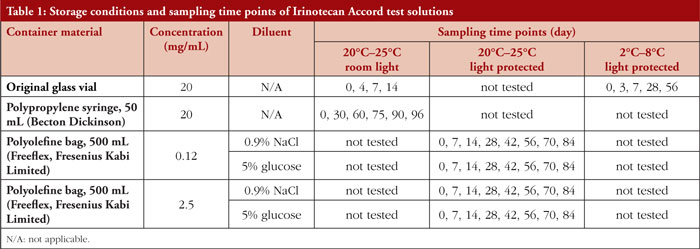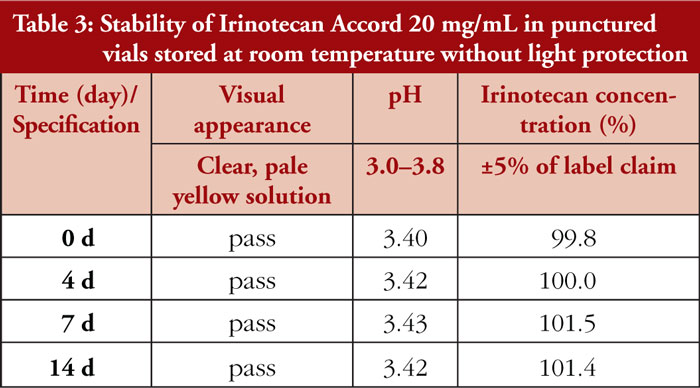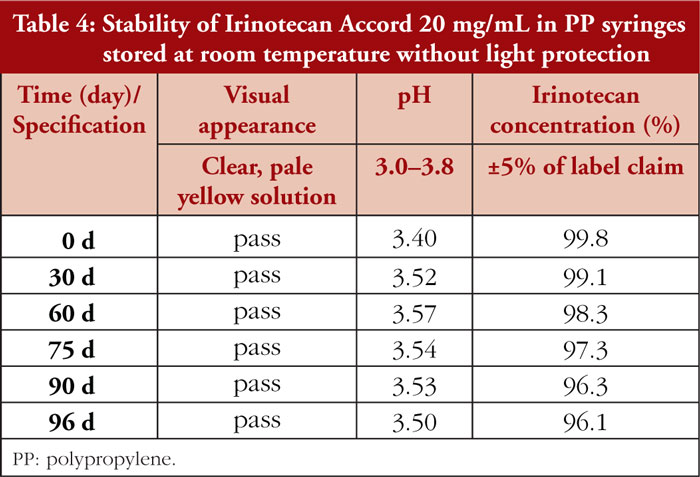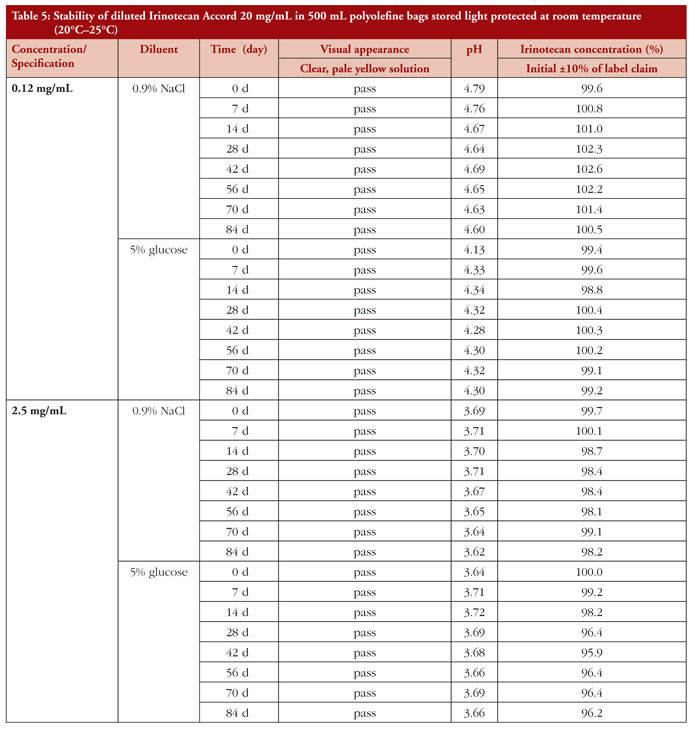Physicochemical stability of Irinotecan Accord in punctured original vials and polypropylene syringes and after dilution with 0.9% sodium chloride or 5% glucose solution in polyolefine bags
Published on 2024/09/11
Generics and Biosimilars Initiative Journal (GaBI Journal). 2024;13(2):75-8.
Author byline as per print journal: Irene Krämer, PhD; Frank Erdnuess, PhD; Judith Thiesen, PhD
|
Study objectives: To determine the physicochemical stability of undiluted Irinotecan Accord concentrate in punctured original glass vials, in polypropylene (PP) syringes, and after dilution with 0.9% sodium chloride solution or 5% glucose solution in polyolefine (PO) bags at different concentrations and storage conditions for up to 96 days. |
Submitted: 12 February 2024; Revised: 15 April 2024; Accepted: 26 April 2024; Published online first: 6 May 2024
Introduction
Irinotecan, a semisynthetic derivative of camptothecin, is an antineoplastic agent. Irinotecan and its active metabolite, SN-38, are type I DNA topoisomerase inhibitors that induce single-strand breaks, replication arrest, and lethal DNA damage. Irinotecan is indicated either alone or in combination in the first- and/or second-line treatment of solid tumours, including colorectal, pancreatic, and lung cancer [1]. In aqueous solutions, irinotecan undergoes a pH-dependent reversible cleavage from the active ring-closed form to the inactive carboxylate form. Acidic pH values below pH 4.0 favour the presence of the active ring-closed form [2]. Thus, licensed irinotecan medicinal products contain lactic acid to ensure a stability-promoting acidic pH value after dilution [3]. Diluted infusion solutions (vehicle: 0.9% sodium chloride, 5% glucose infusion solution) are known to be physicochemically stable for 28 days when stored light protected at 5°C or 25°C [3, 4]. Light exposure reduces the physicochemical stability to three days [3]. The physicochemical stability of the undiluted irinotecan concentrate in punctured original vials is given for 28 days [4].
Study objectives
To determine the physicochemical stability of Irinotecan Accord 20 mg/mL concentrate in punctured original vials and in 50 mL polypropylene (PP) syringes, as well as after dilution with 0.9% sodium chloride or 5% glucose solution in 500 mL polyolefine (PO) bags at concentrations of 0.12 mg/mL and 2.5 mg/mL under different storage conditions for a maximum period of 96 days.
Methods
Irinotecan test solutions were prepared under EU Class A conditions and in accordance with the principles of Good Manufacturing Practice. A total of six different test solutions were prepared by using the European Medicines Agency (EMA) licensed Irinotecan Accord 20 mg/mL (batch numbers N10684 and P13150). Undiluted test solutions were stored either at 20°C–25°C without light protection or light protected in the refrigerator (2°C–8°C). All diluted test solutions were stored light protected at room temperature (20°C–25°C). Samples were taken and analysed initially (Day 0) and at predetermined time points. For detailed information, see Table 1.
The physical stability analysis of all test solutions comprised pH measurements (using a glass electrode calibrated with standard buffer solutions) and visual inspections under standard laboratory light for any changes in colour, clarity, or the presence of particulate matter. Undiluted test solutions stored refrigerated in punctured vials underwent an additional determination of sub-visible particles initially and at the end of the study (Day 56) by light obscuration particle count test. The acceptance criteria for particulate matter ≥10 μm and ≥25 μm were a maximum of 6,000/container and 600/container, respectively.
Chemical stability was assessed via high-performance liquid chromatography (HPLC) assay, which has been validated for linearity of analytical response and acceptable precision. The assay was proven to be stability-indicating for non-specific degradation of the parent drug [5]. Acceptance criteria were set to a concentration of ±10% of the label claim for all diluted test solution and to a concentration of ±5% of the label claim for undiluted test solutions [5]. In the case of Irinotecan Accord test solutions stored refrigerated in punctured vials, related substances were analysed. Peaks in the HPLC chromatograms were identified by their retention times in relation to the irinotecan main peak and concentrations were calculated. Acceptance criteria for the peaks were set as follows [5]:
- 7-ethyl-10-hydroxy camptothecin: </= 0.2%
- Unknown impurity with rRt 0.18: </= 0.5%
- Maximum single unknown impurity: </= 0.2%
- Total impurities: </= 1.0%
Results
Irinotecan Accord 20 mg/mL concentrate in punctured vials remained physicochemically stable when stored refrigerated under light protection for 56 days. Neither colour change, turbidity, nor visible particles were observed during visual inspection. Sub-visible particle counts also fulfilled the acceptance criteria. Results of pH measurements showed only slight variations (less than 0.25 unit) during the observation period. The HPLC assays revealed only slight variations in irinotecan concentrations at different time points, which were considered to be related to the assay variability, see Table 2. Several peaks of related substances were observed in the chromatograms. One could be identified as 7-ethyl-10-hydroxycampothecin. Single peaks of unknown impurities amounted to less than 0.06%, and total impurities amounted to less than 0.2% of the main peak, thereby fulfilling the acceptance criteria.
Irinotecan Accord 20 mg/mL concentrate in punctured original vials and PP syringes, stored at room temperature under ambient light conditions, remained physically and chemically stable for 14 days and 96 days, respectively. Detailed results are given in Tables 3 and 4.
Diluted Irinotecan Accord 20 mg/mL test solutions stored in PO bags at room temperature with light protection remained physicochemically stable, independent of the vehicle solutions (0.9% sodium chloride, 5% glucose solution), for up to 84 days. For detailed results, see Table 5.
These results are in accordance with the findings of previous investigations, where diluted and undiluted irinotecan solutions were found to be physicochemically stable over test periods of 28 days in PVC bags, regardless of storage temperature [4].
Conclusion
Irinotecan Accord solution concentrate, 20 mg/mL, was found to be physicochemically stable for up to 96 days after first opening. After dilution with 0.9% sodium chloride or 5% glucose infusion solution to concentrations of 0.12 mg/mL and 2.5 mg/mL irinotecan, test solutions were found to be physicochemically stable over the test period of 84 days when stored light-protected at 20°C–25°C.
The remaining contents in punctured original vials can be used cost-effectively for up to 56 days when stored refrigerated and for 14 days when stored at room temperature. Undiluted Irinotecan Accord 20 mg/mL concentrate in PP syringes can be used for 96 days when stored at room temperature. Diluted infusion solutions in PO bags with irinotecan concentrations of 0.12 mg/mL and 2.5 mg/mL may be prepared in advance by pharmacy-based cytotoxic preparation units and used over a period of 84 days, when stored light protected at room temperature, see Table 6.
Analysis was performed and documented by an accredited external laboratory. Results were carefully checked for plausibility and cautiously interpreted.
Funding sources
This study was funded by Accord Healthcare.
Competing interests: The authors Irene Krämer, Frank Erdnuess, and Judith Thiesen have no competing interests to declare.
Provenance and peer review: Not commissioned; externally peer reviewed.
Authors
Professor Irene Krämer, PhD
Frank Erdnuess, PhD
Judith Thiesen, PhD
Department of Pharmacy, University Medical Center of the Johannes Gutenberg University Mainz, 1 Langenbeckstraße, DE-551311, Mainz, Germany
References
1. de Man FM, Goey AKL, van Schaik RHN, Mathijssen RHJ, Bins S. Individualization of Irinotecan treatment: a review of pharmacokinetics, pharmacodynamics, and pharmacogenetics. Clin Pharmacokinet, 2018;57(10):1229-54.
2. Li WY, Koda RT. Stability of irinotecan hydrochloride in aqueous solutions. Am J Health Syst Pharm. 2002;59(6):539-44.
3. Accord Healthcare Limited. Summary of product characteristics for Irinotecan Accord 20 mg/mL concentrate for solution for infusion (last updated October 2023).
4. Thiesen J, Krämer I. Physicochemical stability of irinotecan injection concentrate and diluted infusion solutions in PVC bags. J Oncol Pharm Pract. 2000;6(3):115-21.
5. Accord Healthcare Limited. Data for assay and acceptance criteria on file; 07-06-13 and 04-03-14.
|
Author for correspondence: Judith Thiesen, PhD, Department of Pharmacy, University Medical Center of the Johannes Gutenberg University Mainz, 1 Langenbeckstraße, DE-55131 Mainz, Germany |
Disclosure of Conflict of Interest Statement is available upon request.
Copyright © 2023 Pro Pharma Communications International
Permission granted to reproduce for personal and non-commercial use only. All other reproduction, copy or reprinting of all or part of any ‘Content’ found on this website is strictly prohibited without the prior consent of the publisher. Contact the publisher to obtain permission before redistributing.







